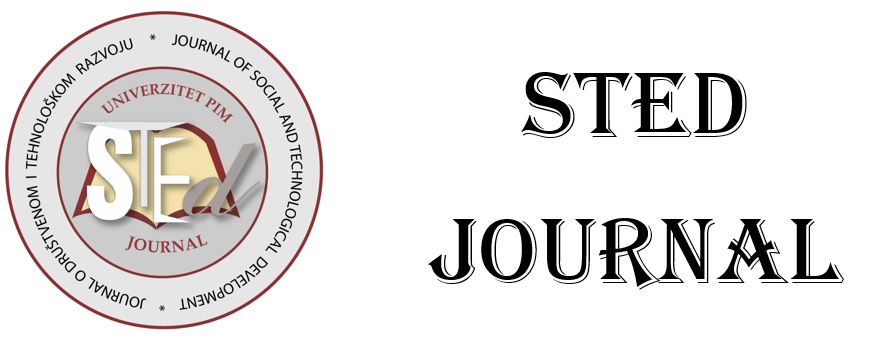Current issue

Volume 7, Issue 2, 2025
Online ISSN: 2637-2614
ISSN: 2637-2150
Volume 7 , Issue 2, (2025)
Published: 28.11.2025.
Open Access
All issues
Contents
30.04.2024.
Original scientific paper
ARTIFICIAL INTELLIGENCE: EFFECTS ON SOCIETY, THE ECONOMY, AND ITS REGULATION
The beginnings of artificial intelligence are linked to 1956 and the Dartmouth conference organized by Stanford University. From those beginnings until the end of the 20th century, its development was relatively slow due to hardware and software limitations. However, the 21st century brings a turning point in every sense. ln the 21st century, there was also a division into specialized artificial intelligence, which was primarily developed in the 20th century, and general artificial intelligence, on which the focus of development has been placed in recent decades. The positive economic effects of the adoption of artificial intelligence, according to the conducted research, are unequivocal. The effects on individuals and humanity are significantly more open to discussion. Almost half of the respondents in the conducted research are not in favor of accepting artificial intelligence for private purposes, and the other half is almost equally divided between those who do not have an opinion on this issue and those who are not against its acceptance. About 70% of respondents believe that artificial intelligence can become a threat to humanity and the mental health of individuals. At the same time, the majority of respondents do not see challenges in their employment. As a solution, the respondents see a clear and strict regulation of the development and possibilities of artificial intelligence itself. Institutions of the society we live in and companies that develop artificial intelligence are seen as responsible for this regulation. A real step in this direction was taken by the European Union with the adoption of the Act on Artificial Intelligence in March 2024. What is expected is that this example of the EU will be followed by other countries, which would ensure the correct development and use of artificial intelligence for the general benefit of humanity, which it should serve.
Darko Vaselić, Nikola Vojvodić, Jelena Jovović
30.04.2024.
Short scientific paper
ATTITUDES OF DIGITAL TECHNOLOGY USERS ON THEIR IMPACT ON DAILY LIFE, WORK, AND MENTAL HEALTH
The digital technological revolution began in the second half of the last century. Its development in the first decades after the discovery of the transistor was rather slow. Acceleration and a wider awareness of the possibilities began to spread after the introduction of the Internet. And then the last two decades brought rapid development of digital technologies and general acceptance in private and business life. The benefits for individuals, companies, institutions and society as a whole are enormous and unquestionable. Nevertheless, bearing in mind the conducted studies on the degree of digitization of certain areas of society and certain countries, it is considered that the potential is huge. And significant breakthroughs supported by artificial intelligence are still expected. However, in addition to the undoubted benefits, there are also certain negatives, which are not sufficiently clarified or which are often obscured. Therefore, this paper aimed to determine the attitudes of the users themselves towards digital technologies, and in its last part, it examined the existence of negative effects on the mental health of users of digital technologies. The results are expected in the part of the examination of the benefits arising from the use of digital technologies. The existence of negative effects on the health of users is not a surprise either. The surprise is the degree of negative impact and lack of corrective action by the user. In other words, users are aware of the negatives that arise from, primarily, the excessive use of digital technologies, but they still do almost nothing to reduce these negative consequences.
Darko Vaselic, Ljubica Janjetović
30.05.2022.
Original scientific paper
CORPORATE SOCIAL RESPONSIBILITY IN BANKING INDUSTRY
Capitalism has brought increase of competition pressure year on year. This competitive situation has influenced a need of corporation flexibility on the markets where exists and consequently development of soft skills in doing business as well. All this has influenced emerging of Ethical code in doing business of corporations, where is defined what is acceptable and what is not acceptable in business conduct. One of the fields of ethic code is society responsible business conduct represented in Corporate Social Responsibility (CSR) policies. CSR activities, if implemented properly, positively influence corporate business. In the first place this is in area of client relationships represented in easier access to a clients and retention of the clients. Except this positive effect of CSR polices there is also positive effect in the area of employment represented in easier access to better quality of employees, in longer retention of those employees and in improved motivation of the employees. All this positively influence business of corporations which implement CSR activities which also has positive effect in their profitability and in their competitive status on a market. With this is also set aim of this paper which is to investigate if there is positive correlation between a bank`s business success and success of implementation of Corporate Social Responsibility programs in society where it does a business.
Darko Vaselić, Srđan Šuput










